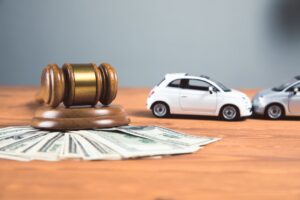If you sustained injuries in a car crash that resulted from another driver’s negligence, you may be entitled to various types of settlement compensation, including for your related medical expenses, lost income, mental distress, and pain and suffering. In most cases, a car accident lawyer will deal with the at-fault party’s insurance company when it comes time to negotiate settlement compensation. However, insurance companies are not on your side and will do anything to undervalue – or even deny – your car accident claim. Your attorney will aggressively negotiate for fair settlement compensation on your behalf. If your case settles, then it will conclude and litigation will not be necessary. However, if the insurance company will not make you a fair offer, your lawyer can pursue litigation in the court system and either take your case to trial or pursue one or more alternative dispute resolution (ADR) options.
What are the Causes of Most Car Crashes?
 Negligence on the roads remains a persistent catalyst for car accidents, often resulting from the actions of other drivers who fail to prioritize safety. One prevalent manifestation of this negligence is distracted driving. In an era dominated by smartphones and constant connectivity, drivers frequently succumb to the allure of texting or engaging with their devices while behind the wheel. However, this diversion often compromises their attention, reaction time, and overall ability to navigate the road safely.
Moreover, reckless driving constitutes another significant contributor to accidents. Some individuals exhibit a blatant disregard for traffic laws, aggressively weaving in and out of lanes, exceeding speed limits, and ignoring traffic signals. This reckless behavior not only endangers the perpetrator but poses a grave threat to fellow road users. The impulsive decisions of one driver can set off a chain reaction, leading to collisions that may have been preventable with a more cautious approach.
Inadequate adherence to traffic rules also plays a pivotal role in fostering accidents. Running red lights, neglecting stop signs, and disregarding right-of-way principles often contribute to a chaotic and hazardous driving environment. These lapses in judgment often stem from a combination of impatience and a misguided sense of entitlement, creating an atmosphere where serious accidents and injuries become an unfortunate consequence.
The failure to recognize and yield to the right-of-way, particularly at busy traffic intersections, accentuates the dangers on the road. Drivers who overlook the importance of yielding can trigger collisions that result in severe consequences.
Additionally, intoxicated driving remains a persistent threat, with drivers under the influence of alcohol or drugs posing a serious risk to themselves and others. These individuals compromise their cognitive abilities, coordination, and overall control of their vehicle. The repercussions of impaired driving extend far beyond the individual, affecting the lives of innocent drivers, passengers, and bystanders who may become victims of a preventable tragedy.
If you suffered injuries in a car crash that a negligent driver caused, an experienced car accident lawyer in your area can investigate your accident circumstances and file a claim with the appropriate insurance company.
Negligence on the roads remains a persistent catalyst for car accidents, often resulting from the actions of other drivers who fail to prioritize safety. One prevalent manifestation of this negligence is distracted driving. In an era dominated by smartphones and constant connectivity, drivers frequently succumb to the allure of texting or engaging with their devices while behind the wheel. However, this diversion often compromises their attention, reaction time, and overall ability to navigate the road safely.
Moreover, reckless driving constitutes another significant contributor to accidents. Some individuals exhibit a blatant disregard for traffic laws, aggressively weaving in and out of lanes, exceeding speed limits, and ignoring traffic signals. This reckless behavior not only endangers the perpetrator but poses a grave threat to fellow road users. The impulsive decisions of one driver can set off a chain reaction, leading to collisions that may have been preventable with a more cautious approach.
Inadequate adherence to traffic rules also plays a pivotal role in fostering accidents. Running red lights, neglecting stop signs, and disregarding right-of-way principles often contribute to a chaotic and hazardous driving environment. These lapses in judgment often stem from a combination of impatience and a misguided sense of entitlement, creating an atmosphere where serious accidents and injuries become an unfortunate consequence.
The failure to recognize and yield to the right-of-way, particularly at busy traffic intersections, accentuates the dangers on the road. Drivers who overlook the importance of yielding can trigger collisions that result in severe consequences.
Additionally, intoxicated driving remains a persistent threat, with drivers under the influence of alcohol or drugs posing a serious risk to themselves and others. These individuals compromise their cognitive abilities, coordination, and overall control of their vehicle. The repercussions of impaired driving extend far beyond the individual, affecting the lives of innocent drivers, passengers, and bystanders who may become victims of a preventable tragedy.
If you suffered injuries in a car crash that a negligent driver caused, an experienced car accident lawyer in your area can investigate your accident circumstances and file a claim with the appropriate insurance company.
Locations Where Car Accidents May Happen
Car accidents are more likely to occur in specific settings and scenarios, often influenced by environmental factors and negligent human behavior. Traffic intersections emerge as focal points of heightened risk because many different traffic streams converge there. When other drivers fail to yield and violate other road rules, they significantly increase the risk of an accident. Residential areas, characterized by lower speed limits and the presence of pedestrians and parked cars, also create an environment prone to auto accidents. The mix of various road users and the potential for unexpected events, such as children playing or pets crossing the road, necessitates cautious driving to mitigate the risks associated with these locales. Highways and expressways, while designed for high-speed travel, also harbor inherent dangers. Excessive speeds, rapid lane changes, and the potential for driver fatigue on long stretches of road accentuate the risk of accidents. Construction zones introduce additional hazards, marked by reduced lanes, altered traffic patterns, and the presence of construction equipment. Drivers navigating through these areas must exercise heightened vigilance, as sudden changes in the road layout and the presence of construction workers demand a more cautious approach to prevent accidents. Parking lots, despite their seemingly benign nature, also witness a considerable number of accidents. The close proximity of vehicles, obscured visibility, and the mix of pedestrians and cars create a breeding ground for fender-benders and collisions. Negotiating these spaces requires a combination of patience, awareness, and adherence to traffic rules to mitigate the risks associated with parking lot accidents. In essence, the likelihood of car accidents is intricately tied to specific settings and circumstances. If you suffered injuries in a car crash that another driver caused in one of these locations, a car accident attorney in your area can discuss the collision facts with you and pursue the financial recovery you deserve.Injuries in a Car Collision
Car crash injuries span a spectrum of severity, ranging from minor bruises to life-altering trauma. Whiplash, a common injury, occurs when an accident victim’s head jerks forcefully forwards and then backwards – oftentimes in a rear-end collision. Despite being classified as a mild injury, whiplash can result in lingering neck pain and discomfort, emphasizing the effect that even seemingly “minor” accidents can have on an accident victim’s well-being. Traumatic brain injuries (TBIs) represent a more severe consequence of car crashes, encompassing a range of injuries from concussions to more critical brain damage. The sudden deceleration or force in a car collision may cause the accident victim’s brain to collide with their skull, leading to cognitive impairment, memory loss, and, in extreme cases, long-term disabilities. Orthopedic injuries, involving the bones, joints, and soft tissues, are also prevalent in car accidents. Fractures, dislocations, and sprains can result from the intense forces exerted during a collision. These injuries often necessitate medical intervention, including surgeries and rehabilitative therapies, to restore functionality and reduce long-term complications. Internal injuries, though not immediately apparent, may also pose significant threats. Organ damage, internal bleeding, or injuries to vital structures can manifest hours or even days after the crash. Prompt medical attention is crucial to identify and address these hidden injuries before they escalate. Emotional and psychological trauma is another facet of car crash injuries. The emotional toll of an accident can manifest in post-traumatic stress disorder (PTSD), anxiety, and depression. Coping with the aftermath of a traumatic event often requires psychological support and counseling to facilitate recovery. Car crash injuries encompass a diverse array of physical and psychological consequences. If you suffered any of these injuries in your accident, a knowledgeable car accident lawyer can take the necessary legal steps in your case while you focus on making a full medical recovery.Car Accident Settlements
Settlements in car accident cases revolve around negotiations between the involved parties to reach a resolution without going through a lengthy and costly trial. Typically after an accident, the injured party (or plaintiff) files a claim against the at-fault party's insurance company. This initiates the settlement process, aiming to compensate the victim for damages incurred, including medical expenses, property damage, and sometimes pain and suffering. Insurance companies, representing the at-fault party, investigate the claim and assess liability. They consider evidence such as police reports, witness statements, and medical records to determine the extent of their policyholder's responsibility. Once liability is established, negotiations commence to determine a fair and equitable settlement amount. During negotiations, the injured party’s attorney presents evidence of their damages and the effect of the accident on their life. This may include medical bills, repair estimates, and documentation of lost income. The goal is to persuade the insurance company to offer a settlement amount that adequately compensates the victim for their losses. Insurance adjusters play a crucial role in this process, evaluating the presented evidence and making a counteroffer. The back-and-forth negotiations continue until both parties reach a mutually acceptable settlement amount. It's important to note that settlements are voluntary agreements, and neither party is obligated to settle if the terms are not satisfactory. Once an agreement is reached, the insurance company issues a settlement check to the injured party. In exchange, the injured party typically signs a release, relinquishing their right to pursue further legal action related to the specific accident. This release is a crucial legal document that finalizes the settlement, providing closure to the case. While settlements offer a quicker resolution compared to a trial, they require careful consideration. Parties should assess the adequacy of the proposed settlement amount, taking into account current and future expenses. In your case, an experienced car accident lawyer can navigate the complexities of the negotiation process, ensuring that any proposed settlement offer truly reflects the full extent of your damages.Car Accident Litigation
 Car accident litigation unfolds as a legal process initiated when the parties involved cannot reach a settlement agreement. The injured plaintiff files a lawsuit against the at-fault party (or defendant). The plaintiff's lawyer drafts a complaint outlining the details of the case, alleging the defendant's negligence and seeking compensation for damages.
The defendant responds to the complaint, presenting their version of events and legal defenses. Both sides engage in a discovery phase, exchanging relevant information and evidence. This phase often involves depositions, where witnesses provide sworn testimony, and document requests to gather pertinent records.
Either party may file pretrial motions to address legal issues or request specific actions from the court. If a resolution is still elusive, the case proceeds to trial. During the trial, both parties present their arguments, witnesses testify, and lawyers introduce documentary evidence. A judge or jury then determines liability and assesses damages.
An experienced car accident lawyer in your area can guide you through the intricacies of the legal system and pursue a favorable litigation result in the court system.
Car accident litigation unfolds as a legal process initiated when the parties involved cannot reach a settlement agreement. The injured plaintiff files a lawsuit against the at-fault party (or defendant). The plaintiff's lawyer drafts a complaint outlining the details of the case, alleging the defendant's negligence and seeking compensation for damages.
The defendant responds to the complaint, presenting their version of events and legal defenses. Both sides engage in a discovery phase, exchanging relevant information and evidence. This phase often involves depositions, where witnesses provide sworn testimony, and document requests to gather pertinent records.
Either party may file pretrial motions to address legal issues or request specific actions from the court. If a resolution is still elusive, the case proceeds to trial. During the trial, both parties present their arguments, witnesses testify, and lawyers introduce documentary evidence. A judge or jury then determines liability and assesses damages.
An experienced car accident lawyer in your area can guide you through the intricacies of the legal system and pursue a favorable litigation result in the court system.
Damages in a Car Accident Case
In the aftermath of a car collision, victims may be entitled to various types of damages, each addressing different aspects of their losses. One primary category is economic damages that encompass tangible financial losses. Medical expenses are a significant component, covering costs such as hospital bills, surgeries, medications, and rehabilitation. Property damage, including repairs to the vehicle, is also factored into economic damages. Lost income represent another form of economic damages, compensating the victim for income they lost due to the inability to work during recovery. Future earning capacity may also be recoverable if the victim’s injuries result in long-term or permanent impairment, affecting their ability to earn money. Non-economic damages, on the other hand, address more subjective losses that are challenging to quantify. Pain and suffering, reflecting the physical and emotional distress endured, form a substantial part of non-economic damages. This compensation acknowledges the intangible toll of the accident on the victim's overall well-being. Loss of consortium is another type of non-economic damage, compensating the victim's family for the negative effects on their relationships and companionship due to the injuries sustained. Emotional distress, anxiety, and depression resulting from the accident can also contribute to non-economic damages. In cases where the at-fault party's actions were particularly egregious, punitive damages may be available to the injured accident victim. These damages aim to punish the wrongdoer and prevent similar future behavior. However, punitive damages are not a guaranteed component of every car collision case and are typically reserved for instances involving extreme negligence or intentional harm, such as drunk driving cases. The specific types and amounts of recoverable damages depend upon the circumstances of a car accident and the extent of the victim’s injuries. A car accident lawyer in your area will do everything possible to maximize your overall compensation and obtain a favorable settlement on your behalf.Speak to a Local Car Accident Attorney about Your Case Today

